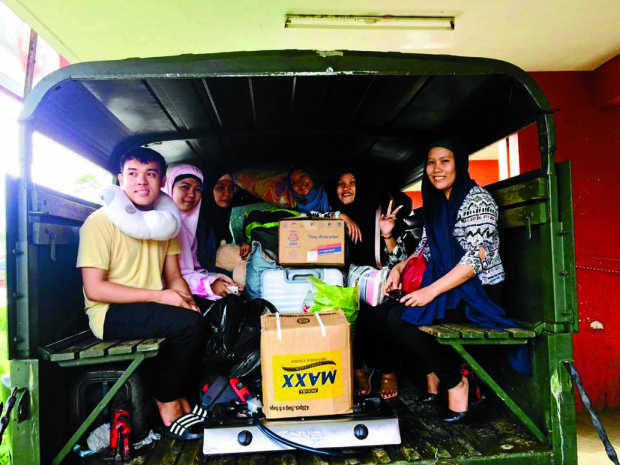‘We thought it was the end of the road for us’

RESCUED. The trapped Tacurong City students on board a military truck en route to Iligan on Thursday morning.
COTABATO CITY — They were at Mindanao State University (MSU) to review for their social work board exams when the Maute Group overran Marawi City on Tuesday. Shortly after, seven students from Notre Dame of Tacurong College and their MSU classmates found themselves trapped inside the university dorm for two “horrifying” days.
It was “faith in God and help from [their] Muslim friends and classmates” that saw them through, said Dey Ann Castillon, 19, who recalled their ordeal when the local terrorist group stormed Marawi on May 23.
Rescued by government forces on Thursday and brought here by disaster officials of the Autonomous Region in Muslim Mindanao (ARMM) en route to Tacurong City, the students—one male and six females—said that at one point, they thought “it was the end of the road for us.”
There were 11 of them from the dorm, Castillon recalled, including a Yemeni national, a Tausug and two female locals.
She and her classmates Eana Gaile Beleño, 20; Jay Gee Villaruz, 20; Michelle Peniero, 30; Diane Coritana, 20; Judy Ann Gravino, 20, and Crystal Ebetero, 20, were on their ninth day in Marawi when the terrorists came.
“We were told by our dorm mates to drop on our bellies when the shooting started,” Villaruz recounted. “Then word spread that the Maute Group would kill the non-Muslims among us.”
Muslim prayer
Castillon said their Maranaw classmates then lent them “hijabs,” the Muslim outfit that includes a head covering and a long-sleeved dress for women. “They told us to act naturally and memorize a Muslim prayer, which we did.”
She added: “We wore the Muslim long dress from Tuesday night until Thursday morning when the soldiers brought us to the [provincial] capitol.”
While it seemed like “a difficult and life or death situation,” their Maranaw classmates did not abandon them, Castillon said. “They said if we die, all of us will die. If we survive, all of us will survive. So, we hugged each other as we recited ecumenical prayers.”
Villaruz said their Maranaw friends told them to keep quiet because the Maute gunmen were just outside the dorm, knocking on the gates.
“We talked in whispers, put our mobile phones on silent mode and scattered across the room on our mats. We were also told not to use our phones at night because the light might attract the terrorists,” he recalled. “We had the two longest nights in our lives.”
Added Villaruz: “We could not even use the comfort rooms because the sound of flushing might attract the Maute. I had to pee beside the wall of the toilet, while my female companions had to use the floor and slowly wash it with water to minimize the noise.”
Automatic gunfire
At night, they stayed low on the floor as bursts of gunfire reverberated in the city. Days were filled with the sound of military helicopters firing rockets, and the sporadic sounds of automatic gunfire.
Castillon said their Yemeni dorm mate told them not to worry and to keep praying. “He told us ‘if the terrorists come, I will have my head cut off for you and keep you safe.”
Dawn of Thursday, men in fatigue uniforms came knocking.
“We were terrified because we thought they were terrorists in Army uniforms,” Castillon said.
She opened a small opening high on the gate and addressed the men in Filipino: “Are you really soldiers or are you Maute terrorists?” They responded in Tagalog and showed their IDs, “so we allowed them entry.”
She recalled: “We shouted for joy but it was a subdued cheer. We clapped our hands without making a sound and jumped for joy without sound … We had gotten used to not making any noise. You know that feeling? You’re very happy, yet you cannot make any sound.”
The soldiers escorted the students to the Lanao Sur provincial capitol from where ARMM relief officials brought them to Iligan City and later, to this city.
“To our Maranaw friends, we will never forget your kindness. Someday, we will reciprocate. Surely we will meet again,” Castillon said.














